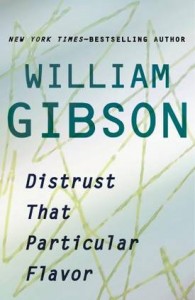 I have been a fan of William Gibson’s novels ever since my early teens. I was first exposed to his work in 1988 through the Neuromancer game that had been made for the Commodore 64, and which I had bought with my Christmas money when we visited my grandparents at their winter home in Florida.
I have been a fan of William Gibson’s novels ever since my early teens. I was first exposed to his work in 1988 through the Neuromancer game that had been made for the Commodore 64, and which I had bought with my Christmas money when we visited my grandparents at their winter home in Florida.
The game made me want more of the world Gibson had created, so I began looking for a copy of the novel. When I finally found and read Neuromancer, I was hooked, and soon enough I had read the remainder of the Sprawl trilogy.
Since then, I have read almost every piece of fiction Gibson has written, but my interest in his work has somewhat waned over the last few years due to my focusing on nonfiction rather than fiction, and I have not yet read his latest two novels. When I saw his latest book Distrust That Particular Flavor — a collection of essays and speeches written over the past 25 years — at my local bookshop, I figured I could both make up for the last few years while still reading nonfiction.
I was not disappointed. In Distrust, Gibson discusses everything from his answer to why so much of his fiction takes place in Japan to his early obsession with buying vintage watches on eBay, and from the process of making “Johnny Mnemonic” into a movie to his visit to Singapore (which he likens to Disneyland, but with the death penalty).
Gibson’s essays are reminiscent of his novels. The writing is idiosyncratic and angular, and the man responsible for the quip according to which “the future is already here, it’s just not evenly distributed” offers plenty of other aphorisms throughout Distrust.
Ultimately, Gibson’s most interesting insights relate to his fiction. In Distrust, Gibson tells us that just as Orwell’s 1984 had more to do with Britain in 1948 than with any foreseeable future, Gibson’s own science-fiction novels are more about the present than they are about the future. This has already had me going back to my copy of Neuromancer, just to see what Gibson thought about the US in 1984.
Facebook and Signalling: Are There Negative Consequences to not Being on Facebook?
From a letter to the editor published in last Saturday’s New York Times:
[O]ne big concern I have not seen discussed is whether not having a Facebook page is a liability.
An acquaintance recently told me that his church had hired a new minister. The final decision on which of two excellent candidates to hire came down to their Facebook pages. Presumably, candidates without Facebook pages didn’t get a second look.
Are we at the point where low Internet presence equals low job prospects?
We’ve all heard theories according to which Facebook is an enabler of narcissism, but this raises an interesting point regarding Facebook’s signalling potential.